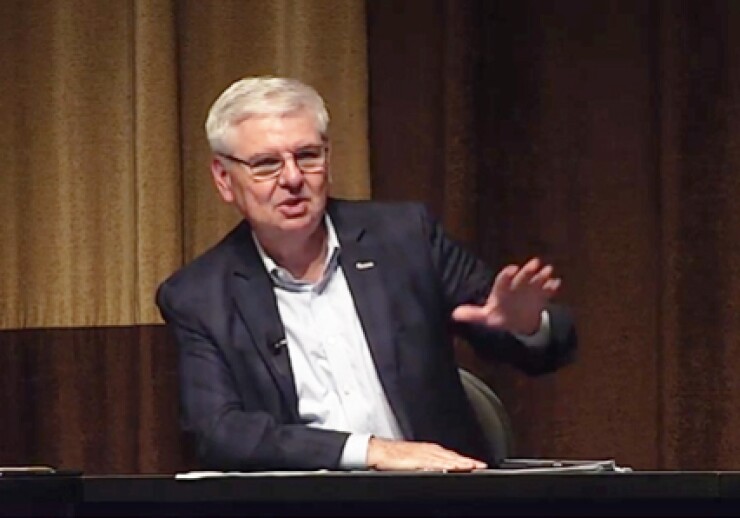Accounting
Barry Melancon: The most important man in accounting
Published
6 months agoon


The most important man in accounting originally intended to be a lawyer.
When Barry Melancon — who is retiring at the end of this year after three decades of leading the accounting profession as president and CEO of the American Institute of CPAs — started college at Nicholls State University in Louisiana in 1975, accounting wasn’t even on his radar.
“If you went back to my high school yearbook, I believe it would tell you that I wanted to be a lawyer,” he recalled, and when he started in his first semester, he was majoring in pre-law.
Coming from what he describes as “a very modest family” — his father had been pulled out of school in sixth grade to cut sugarcane by hand on the family farm — he explained that, “There wasn’t a frame of reference for me, really, about the CPA profession.”
That changed in his second semester, though, because he realized that he wanted to know more about business, and he chose accounting as a concentration largely because it offered the most comprehensive introduction to business: “If I majored in accounting, I would take all the other disciplines, because it was required — I would take management and marketing and economics and finance and, of course, accounting. And it just felt like if I wanted to know business — still probably within the back of my mind being a lawyer — that was going to give me the broadest base of knowledge.”
Then, in an epiphany experienced by countless CPAs before and since, he took the entry-level accounting course and was hooked.
“I liked it — I don’t think it’s the right course and we’re talking about changing it today, and I never thought it was the right course then,” he said. “It was way too mechanical to teach accounting. But I grasped the notion of what accountants really were doing, and so I changed my major into accounting after that first year.”
(See our 2024 list of the
Having made the choice, he charged ahead at full speed, finishing his undergraduate accounting degree in 3 ½ years, quickly landing a job at a small local firm, Bergeron & Co., and making partner there by the unprecedented age of 25. Not long after that he became the head of the Society of Louisiana CPAs, and seven years later he was named the youngest-ever head of the AICPA at 37. (He was actually hired when he was 36, but they delayed his start date until after his birthday so it would look better in the press release.)
By the time he arrived at the institute, Melancon had long since fully committed himself to accounting — and he had strong ideas about where he wanted to take the profession, and that would mean major changes at its main membership organization.
“Professional bodies in any profession usually have a DNA about saying why a profession couldn’t or shouldn’t do things,” he explained. “And I think what we created and what I had a passion about was to be an organization that led a profession, that worked with the profession to actually give permission to be much broader than what it was, to see those opportunities and what was in the best interest of the profession and the public interest — not to be an organization that tried to figure out why you might want to be really careful, or to say you shouldn’t do these types of things.”
While it’s far from the only thing Melancon has accomplished during his long tenure, shifting the AICPA from being an inhibitor to an enabler — and driving the profession as a whole to be more open to new opportunities and approaches and risks — may well be how he’s had the most influence.
“We need to have a mindset of the things we can do, rather than the reasons why we can’t,” he said, “and I think the profession embodies that today.”
Getting it in writing
To understand how Melancon rose to the level where he was able to wield that kind of influence, it helps to know that he had it written on his list of goals from the get-go.
Early in his career at Bergeron, Melancon started keeping a written list (he still keeps it, only now it’s on his phone), because a partner at the firm suggested it.
“One time this partner and I were going to a client, and the partner was building a new house and we passed in front of his house and he said, ‘You see, even before my house is being built, we have a pool in it. I had a written goal.’ This is what he said: ‘I had a written goal to have a pool, and now I’m able to achieve that.’ And he basically impressed upon me — I might have been 21 at that point — how important written goals were.”
And high on the list Melancon started keeping was a goal that sounds an awful lot like a job description for the head of the AICPA: “Literally I had a written goal to fly around, get off a plane and give speeches,” he said with a laugh. “I mean, it wasn’t worded exactly like that.”

AL POWERS
Also on the list was making partner by 25 — an objective he almost didn’t fulfill, because a client offered him a job at a substantially higher salary than he was making at his firm.
“I was at Bergeron & Co. about nine months, and I was making $15,000 a year, and I had a client offer me a job at $25,000,” he recalled. “And when you’re making $15,000, $25,000 is a big increase, right?”
Feeling tempted, he told the partners of the firm about the offer — and even today, 40 years later, he makes a point of telling firm leaders about their response: “What they did is they said, ‘Let’s go to lunch.’ We had a 2 ½-hour lunch and basically they painted a picture for me of what being a partner was going to be like in the firm — basically what they made — and they painted the picture so well and it was one of my goals, that it caused me to say, ‘I am not doing this.’ I’m not leaving because I will always regret not experiencing that outcome.”
Not every goal on the list gets fulfilled, though; for instance, he originally had a goal to retire at 55: “But when I got later in my career, I said that’s a really dumb goal.”
The people around you
Of course, merely willing a thing (even in writing) isn’t always enough to make it come true. It also takes hard work and determination, which Melancon has always been willing to put in — and it certainly helped that leaders all around him recognized his talent early.
“The people around you in your life really determine who you are, and it’s important to understand that,” he said.
The day he passed the CPA exam, for instance, a partner at Bergeron & Co. congratulated him by taking his own name off an LSCPA committee, and having them put Melancon on it.
“So literally I was on a society or a professional committee the first day I was a CPA in my career,” he said, and he only got more involved, chairing committees and putting his minor in government from Nicholls to good use on advocacy work in the state.
(See who the most influential people in the profession
He was so active, in fact, that when the then-CEO of the society moved to the top spot at the Texas state society, both he and the CPA who succeeded him as head of the LSCPA offered Melancon the No. 2 spot at their respective organizations. Having just made partner at Bergeron, he turned them both down — but three years later when the Louisiana position opened up again and the then-chair made it clear that the job was his for the taking, he said yes.
“Really, what my wife and I talked about was that, in reality, we can go do this, and what’s the worst case? If I don’t like it, I can go back into public practice,” he said. “Those doors aren’t going to be closed to me.”
He couldn’t know that he wouldn’t return to public practice, and that his seven years at the Louisiana society would lead to him being so active with the AICPA that he would be considered a potential candidate to succeed then-president and CEO Phil Chenok in the mid-1990s.
But when the call came from search firm Korn Ferry, Melancon initially turned them down, too. “I told them no,” he recalled. “I said, ‘I’m probably too young for the institute to hire me and I don’t think that’s going to happen, and so I don’t think I’m going to put my name in.’ And about a month later, they called me back and they said, ‘Look, people want you to put your name in, and if you put your name in, I can guarantee you that you will be one of nine that gets interviewed.’ So, at that point, it’s sort of hard to say no to that.”
It wasn’t just the accountants recommending him to Korn Ferry who envisioned Melancon at the head of the institute. Much earlier, one of the leaders of the LSCPA saw it too. One component of his compensation involved deferred comp that would be forfeited if he left before serving for 10 years; at the time the position at the AICPA came open, Melancon had served seven years, but “unbeknownst to me, one of the society leaders had written into my contract a provision that said — and I didn’t ask for this — you forfeit unless you leave to be CEO of the AICPA. And that was written when I was 30.”
“It’s people around you who see things in you, at least in my case, that have been unbelievable in life,” he said. “For someone to see that in you, to me, is about what people around you make of you and what people around you contribute to you. When someone that was around me saw that — what an incredible compliment and support mechanism that was — it is amazing. I’ve had a lot of luck.”
Promising change
Melancon put his name in the ring, but still didn’t think he had a chance, even though he flew to California to meet the recruiter from Korn Ferry.
“We were supposed to have a one-hour dinner in the San Francisco airport,” he recalled. “And essentially I started that dinner off with, ‘Look, I didn’t go to a name-brand university. I’m 36 years old. I never worked in a big firm. I’m not from the Northeast. You and I both know that the institute is not going to hire me in this job. So, let me tell you what I think ought to happen.'”
The one-hour dinner ended four hours later, after Melancon had outlined all the changes he thought should be made at the institute. “And when I ultimately got into the role,” he said, “I did a lot of the stuff that we talked about.”

Despite — or perhaps because of — his candor with Korn Ferry, Melancon got the job, and felt empowered to implement the changes he had suggested. “I went in with the notion that people put me here and I was going to change the place,” he said. “And in the first 90 days I did a massive reorganization, including many people being asked to leave the institute.”
He cut headcount at the AICPA from 863 to below 600 (a level it maintained for 20 years, until it merged with the Chartered Institute of Management Accountants in 2016). He also began to build up the institute’s advocacy muscles, speed up its processes, promote high-potential talent (including current CEO of public accounting Sue Coffey), and to change what the institute meant to firms — particularly those below the Big Four, who had not been as engaged with the AICPA before.
“I knew the profession was changing and I knew that the institute could not be what a lot of people would have said that it was then — an ivory tower institute — and I also knew that we had to be more entrepreneurial and that the profession had to be more entrepreneurial and that’s what drove me, and we did it,” he said.
From there to the future
A wholesale reorganization of the leading organization in the profession would be accomplishment enough for many, but for Melancon, it served to give him a strong platform from which to lead accounting into the future.
The three decades of his tenure have been among the most tumultuous, unpredictable and full of change in accounting’s history, and Melancon has taken the lead in navigating the profession through two recessions, the collapse of Arthur Andersen and the Enron crisis, the creation of major new regulatory regimes in the form of Sarbanes-Oxley and the Public Company Accounting Oversight Board, the rise of the internet and the cloud, a global pandemic, and most recently, the birth of artificial intelligence, through all of which he has charted a proactive course forward, rather than merely reacting.
All that time, Melancon and the institute were pursuing their own agenda — computerizing the CPA exam and taking it international, launching
CPA.com as its technology arm, exploring and proselytizing new services, launching initiatives to boost audit quality, working to promote diversity, aggressively pursuing solutions to the current pipeline program, and, perhaps most ambitiously, merging with CIMA to create an international powerhouse.
With so much to do, it’s easy to see why Melancon has stayed in his role longer than any other leader in AICPA history. “I went in at first with a five-year commitment, so you don’t really know how that is going to play out,” he said. “But I had a passion for the profession and I always have had confidence in myself, so I did not go in to the institute with the notion that this was going to be a short-term process.”
Even with his time at the institute almost up, Melancon is still looking forward, seeing the future course of the profession in his mind, spying out both challenges and opportunities.
He highlights artificial intelligence as a transformational technology that will, like the rise of the internet three decades ago, have repercussions for both society at large and the accounting profession.
“I am not one who’s going to say that with AI, the role of the human is going to be fine, or that it’s always going to be there. I don’t believe that at all,” he said. “I believe that just like a lot of other technologies change jobs, change the quantity of jobs in certain areas, change the expectations of what people do in jobs, it’s going to have an impact; it’s going to change how we define work in society not in the next two years but in the next decade.”
AI’s impact on the profession is going to be tied into an ongoing evolution in the structure of firms and how accountants progress in their careers. “The fundamental change for the profession is that we have been a profession that takes entry-level people … we take in entry-level people and we put them in an environment to progress upward to the middle of the organization,” he explained. “And it takes a while, and the key component of that is a broader set of competencies than just accounting and a broad notion of what you can call business acumen. And when you get to the middle part of an organization, whether it’s a finance function or a firm, your value-add to a client or to your employer is really about those broader skills and your business acumen.”
“Organizations like the AICPA and firms and professional accountancy bodies around the world need to think about how we take an entry-level accountant where technology is going to do the bulk of that entry-level accounting work and how we move them up quickly and get them those broader skills quicker so that they’re value-add players,” he explained. “It is an immense challenge, but we’re going to have to figure it out. And if we figure it out, then starting from human capital, our services are going to change.”
Those challenges will be for the next generation of leaders of the profession to deal with, but Melancon does have some advice for the accountants of the future — and it is, naturally, about taking a broader view of what they, and the profession, can do.
“If we go into every morning and we think, ‘We know accounting,’ we’re not going to have the same future as if we think, ‘We know business information,'” he said. “We really need to take our skills and our competencies and apply it to the broader footprint of business and do it right and effectively, with ethics. And if we do that, we’re going to have a lot of new and different opportunities, and the next generation of our profession is going to be even more successful than the current generation of our profession.”
Much of Melancon’s career can be summed up by a relentless drive to move accounting forward, to improve every aspect of it — but as he looks back, it’s not the impact he has had on the profession that is foremost in his mind, but rather the impact that the people in the profession had on him.
“I would thank the people that I have interacted with, the people in our profession, for how much I’ve learned from so many different people,” he said. “I find it really hard to believe someone can have a career that gets exposed to anything like what I’ve been exposed to, because CPAs and the profession are fantastic, and the people who interact with you and the questions they ask and the contributions they make are just tremendous. … And that knowledge makes one’s life — in my case, my life — so incredibly enjoyable and fulfilled that I’m very appreciative of the profession.”
You may like

No more paper checks; death and tax debt; the perfect time to onboard software; and other highlights from our favorite tax bloggers.
Truths and consequences
- Wolters Kluwer (
https://www.wolterskluwer.com/en/solutions/tax-accounting-us/industry-news ): The snowflake in the blizzard: President Trump has signed an executive order effectively eliminating the U.S. government’s long-standing practice of issuing paper checks — including refunds — to eliminate inefficiencies, reduce costs and enhance payment security. Key provisions of the order and what it could mean to the profession. - Institute on Taxation and Economic Policy (
https://itep.org/category/blog/ ): The House tax plan, by the numbers. - The Wandering Tax Pro (
http://wanderingtaxpro.blogspot.com/ ) And the good, bad and ugly about that big, beautiful bill. - Taxpayer Advocate Service (
https://www.taxpayeradvocate.irs.gov/taxnews-information/blogs-nta/ ): How a “commonsense” proposal in Sec. 903 of the draft TAS Act would simplify estimated tax payments with evenly spaced due dates. - Taxnotes (
https://www.taxnotes.com/procedurally-taxing ): IRC provisions governing consolidated returns are grounded in the identification of an “affiliated group of corporations” (or an “affiliated group”) for which a consolidated return may be made. A few foundational matters and fact patterns to spot an affiliated group. - Current Federal Tax Developments (
https://www.currentfederaltaxdevelopments.com/ ): A U.S. appeals court recently addressed a critical issue for estate tax practitioners: the deductibility of transfers mandated by a prenuptial agreement as “claims against the estate.” - Withum (
https://www.withum.com/resources/ ): When companies face new tariffs or increases to existing ones (who doesn’t, these days?), mechanisms that can be implemented are bonded warehouses, the Customs Reconciliation Program or setting up a foreign trade zone. Plusses and minuses of each, including tax considerations. - Dean Dorton (
https://deandorton.com/insights/ ): How tariffs factor into inventory accounting for income tax purposes, as well as pitfalls that can trigger unfavorable tax consequences.
To the Swift
- Taxjar (
https://www.taxjar.com/resources/blog ): Starting a new biz is likely a time-sucking thrill-a-minute for clients. Take one thing off their to-do list with this sales tax compliance checklist. - TaxProf Blog (
http://taxprof.typepad.com/taxprof_blog/ ): Taylor Swift’s hard-earned reputation as a savvy music mogul inspires other creative spirits to be “fearless” in their artistic endeavors. But a taxpayer’s financial ability to live out their wildest dreams may depend on their chosen medium. - The Sales Tax People (
https://sales.tax/expert-articles/ ): The latest that e-commerce clients need to know about marketplace facilitator laws. - Sovos (
https://sovos.com/blog/ ): While we’re on the subject, what is sales tax, anyway? A step-by-step look. - Trout CPA (
https://www.troutcpa.com/blog ): What to remind them about the FICA Tip Credit. - The National Association of Tax Professionals (
https://blog.natptax.com/ ): This week’s “You Make the Call” looks at Leo, owner of a small HVAC business who recently hosted a summer kick-off barbecue at his shop for his five technicians (he also participated). No customers or other management staff attended. Leo provided sodas, juice, burgers and brats. Is the cost of the food and beverages fully deductible or subject to the 50% limit? - Boyum & Barenscheer (
https://www.myboyum.com/blog/ ): Two financial planning tools to help manufacturer clients weather uncertainty. - Yeo & Yeo (
https://www.yeoandyeo.com/resources ): Never mind the soul. What happens to debt, including tax debt, when someone dies?
Making connections
- Vertex (
https://www.vertexinc.com/resources/resource-library/filter/field_asset_type/blog?page=0 ): Companies seek a lot of benefits from a “connected commerce” strategy. But the pace of change in retail is intense, and tax leaders need to keep an eye on how many shifts can affect compliance. - Mauled Again (
https://mauledagain.blogspot.com/ ): Are tax pros sufficiently social to lower their risk of dementia? - CLA (
https://www.claconnect.com/en/resources?pageNum=0 ): After three filing seasons with Schedules K-2 and K-3, patterns and pain points have emerged. Introduced to improve the reporting of international tax info, these schedules have had far-reaching impacts even for real estate and private equity partnerships with little or no foreign activity. - TaxProCenter (
https://accountants.intuit.com/taxprocenter/ ): Once firms invest in a new tax engine, onboarding and data conversion go on the back burner as firms deal with extended returns. This seemingly logical and unavoidable shift sets the stage for potential mayhem come January. Five reasons extension season is a great time for onboarding. - The Rosenberg Associates (
https://rosenbergassoc.com/blog/ ): Favorite headline of the week: “To PE, or Not to PE, Is That the Question?”
Accounting
GT soups up compliance capacities with AI-based platform
Published
2 hours agoon
May 20, 2025

Compliance professionals at top 10 firm Grant Thornton will now be making use of the newly-enhanced CompliAI platform, which has gone from a largely spreadsheet-driven classic automation solution to one infused with generative AI from end to end to streamline and enhance service delivery.
The platform uses advanced AI capabilities, including GenAI Assistants and a GPT Model Series to automate key tasks such as risk and control rationalization, question and procedure generation, and document request list creation. For example, it will suggest questions for the professional to ask, and based on the answers, generate additional followup questions and tasks. The software also features a suite of tools, including dashboards, task management, in-app commenting, notifications, a methodology document library, and a centralized file repository. This is so professionals can conduct tasks in minutes that would have traditionally taken days or weeks.
Mike Kempe, chief information officer of Grant Thornton Advisors, noted that beyond efficiencies, another major intention with this solution was to create a more consistent experience for their clients. Different professionals approach things in different ways, both in and out of the accounting world, and so the client experience can vary widely depending on who is working on an engagement at a given time. It is hoped that this new platform can smooth out some of that variation so clients can get a better idea of what to expect.
“We’re providing a better service to our client and a much more consistent one as well because we’re no longer relying on the quality of individuals, we’re relying on AI… In the past, the issue was that if I was providing a service I would do it one way, and [if] John was providing the service, he would do it a different way, so clients would get inconsistent quality. With this, we increase the quality, and it’s going to be much more consistent,” he said.
Paradoxically, though, he believes this will actually serve to create a more, not less, personalized experience for clients. By using AI to get through the routine processes that the accountant would ordinarily be doing themselves, they have more time and energy for close collaboration with the specific client and so can take on a more strategic role in compliance engagements.
“Our professionals right now [are focused] on how to use AI and on building that relationship with the client and making this a much more personalized service than we have had in the past,” he said.
The newly-enhanced CompliAI platform is just one more step in GT’s wider AI ambitions. Kempe said they plan to replicate this approach across many more service sectors. The firm has a roadmap for at least five more AI-based solutions released over the next year and a half as part of its vision to incorporate the technology throughout its numerous practice areas. When pressed on the particulars he declined to be too specific, but said people can expect many different solutions.
“There’s a lot of productivity solutions that we’re building at the moment, and we’re working with our partners and some startups as well [to roll it our internally.] There’s a couple more AI solutions in the audit space as well as in the tax space that we’re currently working on… But suffice to say, we’re investing heavily. We’re on a very significant roadmap to put AI into everything we do. That’s our mission,” he said.
Accounting
Accounting firms should start auditing AI algorithms
Published
3 hours agoon
May 20, 2025

Wall Street has learned the hard way that black-box models can wreck balance sheets. Enron’s off-ledger special-purpose entities fooled analysts because auditors lacked the tools, or the will, to probe opaque structures.
Two decades later, AI presents an even thornier transparency challenge, yet the accounting profession already owns the mindset to fix it. We can turn the audit playbook into an AI assurance framework that policymakers have been groping for.
A year ago,
The National Institute of Standards and Technology released the
Regulators are starting to echo that warning.
What would that look like? Start with the three legs every auditor knows: evidence, materiality and independence. Evidence means logging every prompt and output so reviewers can replicate the conclusion. Materiality means setting quantifiable tolerances for algorithmic error, not hand-waving about “low risk.” Independence means assigning a separate team, ideally with data scientists who hold no stake in the model’s success, to challenge assumptions. None of these ideas requires a new federal agency. They require extending time-tested audit standards to predictive code.
Europe has fired the opening shot. The
Skeptics worry about talent shortages, yet firms once trained auditors in statistical sampling when that was new. Tomorrow’s audit associate will need R or Python alongside pivots, but the pedagogy remains: test controls, document exceptions and issue an opinion. The pipeline problem is solvable if higher education integrates AI ethics and assurance modules into accounting curricula now.
A second objection is competitive secrecy. Companies say revealing model internals will hand over trade secrets to rivals. Audit protocols offer a compromise: confidentiality agreements for reviewers plus public summaries of findings, akin to key audit matters. Investors care less about the recipe than about the assurance that the chef followed food-safety rules.
History offers a precedent. When Congress created the Securities and Exchange Commission in 1934, financial statements suddenly had to meet public standards. Far from stifling growth, transparency fueled the longest bull run in history by lowering information risk. AI assurance can do the same. Markets crave clarity more than ever as algorithms move from back-office helpers to decision makers that allocate credit, price insurance and flag Suspicious Activity Reports.
The next 12 months are decisive. The PCAOB is weighing whether to update its audit standards explicitly for AI. Instead of waiting, firms should pilot voluntary algorithm audits and publish the results. The first mover will earn reputational capital that no marketing budget can buy, and the blueprint will help regulators draft proportionate rules.
Trust has always been accounting’s export. In the AI era, the ledger expands from debits and credits to tokens and weights. The discipline that once tamed creative bookkeeping can now tame creative code, and that, more than any flashy demo, is what will keep capital flowing. Audit survived spreadsheets; it will thrive on silicon.

In the blogs: Truths and consequences

Student loan borrowers struggle to get into income-driven repayment plan

GT soups up compliance capacities with AI-based platform

New 2023 K-1 instructions stir the CAMT pot for partnerships and corporations

The Essential Practice of Bank and Credit Card Statement Reconciliation

Are American progressives making themselves sad?
Trending
-

 Economics1 week ago
Economics1 week agoCPI inflation April 2025: Rate hits 2.3%
-

 Economics1 week ago
Economics1 week agoTariff receipts topped $16 billion in April, a record that helped cut the budget deficit
-

 Personal Finance6 days ago
Personal Finance6 days agoHouse Republicans advance Trump’s tax bill. ‘SALT’ deduction in limbo
-

 Economics5 days ago
Economics5 days agoViolent crime is falling rapidly across America
-

 Economics1 week ago
Economics1 week agoGerman business leaders tell new government: It’s time to deliver
-

 Personal Finance1 week ago
Personal Finance1 week agoFidelity technical issues kept some investors out of their accounts
-

 Economics4 days ago
Economics4 days agoThe low-end consumer is about to feel the pinch as Trump restarts student loan collections
-

 Personal Finance1 week ago
Personal Finance1 week agoHow to save on groceries amid food price inflation
